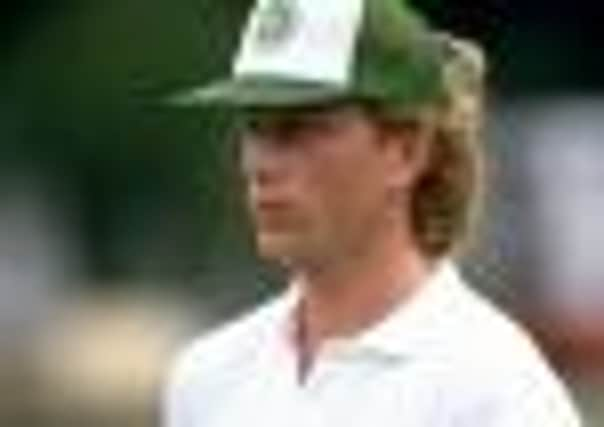Obituary: Graham Dilley, former England fast bowler who partnered Ian Botham in famous comeback against Australia


ON HIS game at his peak, England fast bowler Graham Dilley earned that accolade beloved of all bowlers: unplayable. Though too often injured to be classed in the pantheon of the very greatest bowlers, Dilley nevertheless played a huge part in the success of England and Worcestershire in the 1980s.
Latterly he also coached Scotland’s bowlers, being recruited by national coach Jim Love before the 1999 Cricket World Cup.
Advertisement
Hide AdAdvertisement
Hide AdDilley’s death from cancer at the age of just 52 has shocked the world of cricket, coming just months after the much-publicised 30th anniversary of England’s extraordinary Ashes victory over Australia, which included his heroics with the bat as chief support to Ian Botham in his legendary stand at Headingley.
Dilley was educated at Dartford West School and destined for a trade as a diamond cutter, but his precocious talents as a schoolboy bowler were spotted by Kent County Cricket Club.
In 1977, at the age of just 18, he made his first-class debut for Kent against Cambridge University. He was still growing, and by the time he was 20 in 1979 he was a strapping 6ft 3in tall and a fully fledged professional making his breakthrough as a fast bowler.
In November that year, Dilley made his one-day international debut for England against West Indies in Sydney, and in the following month he was selected against Australia in the Ashes at Perth, becoming the youngest player chosen by England at Test level for 30 years.
The presence of the great Dennis Lillee in the Australian side and Peter Willey’s role as a fielder for England brought about that famous rhyme that was never repeated: Lillee, caught Willey, bowled Dilley.
Dilley took three wickets in the match, and his Test career was off to a fine start. In all he would play 41 times for England, and would have surely earned many more caps were it not for a string of knee, neck and back ailments.
With his shock of blond hair and often insouciant air that belied a very competitive spirit, Dilley was a standout member of a team that knew how to play cricket and enjoy themselves.
Dilley’s pace coupled with a rare outswinging ability made him always a dangerous bowler, and he took wickets against all the Test sides. He was no slouch with the bat, often adding a few vital runs in the lower order, and never more so than in the famous comeback at Headingley in 1981.
Advertisement
Hide AdAdvertisement
Hide AdDilley came in at number nine to partner Ian Botham, with England staring an innings defeat in the face. With the exuberance of youth, Dilley hit the revered Australian attack for several boundaries, and Botham always said he took his lead from his colleague. Together they put on 117, of which Dilley hit 56, his highest Test score, before Botham ended with 149 and Bob Willis bowled like a demon to clinch arguably the most famous victory in English Test history by a mere 18 runs.
Just as his Test and one-day career seemed to be taking off, Dilley suffered a serious neck injury which eventually saw him miss the entire 1984 season.
Recalled by England in 1986 in time for the Ashes series in Australia, Dilley took a superb 5 for 68 in the first Test match at Brisbane to set England on their way to winning the Ashes. Those were not his best Test figures, as he notched 6 for 38 against New Zealand in Christchurch the following winter.
In 1987, Dilley signed for Worcestershire, along with Botham, and together they helped bring about a golden era for the county, winning four trophies in three years, including the County Championship in 1987 and 1988.
In that latter year, Dilley played his last one day international against West Indies at Headingley, and in 1989 he played what became his last Test match against Australia at Edgbaston, ending his career with 138 Test wickets at an average of 29.78.
Dilley had caused controversy over his links with South African cricket – he played for Natal in the mid-1980s – and his England career finished when he joined Mike Gatting’s unofficial touring squad to that country during the era of the boycott over apartheid.
In 1992, Dilley retired from first-class cricket, having endured one too many injuries. He began his coaching career at Surrey, but lost that position and had to undergo a major neck operation in 1994. He suffered unemployment before returning to coaching with the England’s women’s team and Zimbabwe.
Dilley’s brief spell as bowling coach with Scotland was certainly memorable, as it encompassed the national team’s first outing in the World Cup in 1999. Despite playing two matches on home soil at The Grange in Edinburgh, Scotland did not win any of their five matches, though they were beaten by only 22 runs by Bangladesh.
Advertisement
Hide AdAdvertisement
Hide AdNevertheless, Dilley’s coaching reputation had grown apace, and he was asked by England to join their 2001 tour to India as an assistant coach, where he won considerable plaudits for his work with the likes of Andrew Flintoff.
His final coaching post was as head coach at Loughborough University Centre of Cricketing Excellence, where among other achievements he guided the students to victory over county sides.
That Dilley had been diagnosed with cancer was known to his former England teammates, but his death in a Leicester hospice came as a shock to those in cricket and beyond who were unaware of his terminal illness.
Twice divorced, Dilley is survived by his four children, including Worcester RFC captain and England under-19 rugby international Chris Pennell, his son by his first wife Helen, who remarried. His second marriage to Nikki, by whom he had two sons, was also dissolved. MARTIN HANNAN